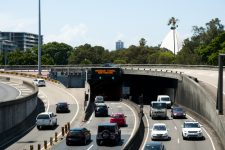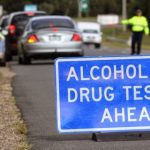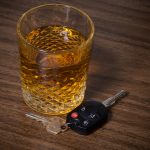New Road Laws: Tougher DUI Penalties, Targeting Phone Use and Cocaine Testing

On 1 July, a series of new road safety laws will come into effect across New South Wales.
The new laws will add cocaine to the list of drugs police test drivers for, significantly increase the penalties for driving under the influence of alcohol and other drugs, and implement technology to detect the illegal use of mobile phones.
Passed through state parliament on 2 May, the Road Transport Legislation Amendment (Road Safety) Bill 2018 is the first legislative step in the NSW government’s Road Safety Plan 2021, which was announced by premier Berejiklian in February last year.
“The plan outlines proven and priority measures to address key contributors to our road toll and to move us towards achieving our State Priority Target, which is to reduce fatalities by 30 percent by 2021,” NSW roads minister Melinda Pavey said during the second reading speech.
The minister stressed that the bill enhances the state’s drug driving law enforcement.
But while there will be stronger penalties for people who drive under the influence of alcohol, and both legal and illegal drugs, the laws do nothing to reform the presence-based roadside drug testing that NSW police currently carry out.
Steeper DUI penalties
Section 112 of the Road Transport Act 2013 (the Act) makes it an offence to use or attempt to use a vehicle under the influence of alcohol or other drugs.
The offence is different to driving with a prescribed concentration of alcohol (such as driving with a low, mid or high rage PCA) in so far as the prosecution must prove beyond a reasonable doubt that the driver was actually under the influence of a particular drug or alcohol.
DUI charges are usually brought when police have failed to comply, or been unable to comply, with procedural requirements relating to PCA offences – such as breath testing within two hours or where the driver has ended up on their own premises. Proving the offence usually requires some evidence of erratic driving and a demeanour or other conduct suggestive of being ‘under the influence’.
Under the reforms, the penalties for DUI have been dramatically increased.
Currently, a first DUI offence attracts a maximum penalty of 9 months imprisonment and/or a fine of $2,200. It also carries an ‘automatic’ licence disqualification of 12 months, which can be reduced by a court to six months.
Under the changes, the maximum prison sentence for a first DUI will double to 18 months and the maximum fine will increase to $3,300. The automatic disqualification period will triple to three years, and the minimum will double to 12 months.
In cases where the DUI is the driver’s second or subsequent major traffic offence within five years, the law currently prescribes a maximum prison term of 12 months and/or a fine of $3,300. The offence comes with an automatic disqualification of three years, which can be reduced by a court to as low as 12 months.
Under the changes, a DUI that is a second or any subsequent major traffic offence will carry a maximum penalty of two years behind bars and/or a $5,500 fine. An automatic five year licence disqualification will apply, which can be reduced to a minimum of two years.
In either case, court will retain its power not to record a conviction. If the court exercises that power, the driver will not be imprisoned, disqualified or fined. This normally occurs where the driver has an otherwise good driving record, a strong need for a driver licence and/or demonstrated reasons to avoid a criminal conviction.
Providing character references and an apology letter to the court, and completing a Traffic Offender Program, can increase the chances of avoiding a conviction or, if a conviction is recorded, reducing the disqualification period and/or the fine.
Driving with a prescribed concentration of alcohol (PCA)
However, most people before the courts for drink driving offences are there after having been tested by a breathalyser.
Under section 110 of the Act, fully licensed drivers are permitted to have a blood alcohol concentration of less than 0.5.
Penalties will start to apply once that concentration is exceeded, and drivers may face court for driving with a low (0.05 – 0.79), middle (0.80 – 0.149) or high range (0.150 or above) prescribed concentration of alcohol.
Immediate driving suspension
“The bill also provides police powers that are intended to limit driving by alleged driving under the influence offenders in the period between an offence and attending court, to more closely resemble the powers to act in the case of high‑range drink drivers,” minister Pavey explained.
The legislation provides that officers will now be able to issue drivers who’ve been charged with driving under the influence with an immediate licence suspension and it will apply until the charge is determined in court.
And a further power has been created that allows police to issue a 48 hour driving prohibition to a driver who has been arrested to undergo blood and urine tests after having refused or failed a sobriety assessment. The provision is contained in the newly inserted section 148E of the Act.
White lines
As of the first of next month, NSW police will be testing drivers on the side of the road for cocaine. The legislation adds the drug to the list of three others that police have already been testing for: amphetamines, MDMA and THC, the psychoactive component of cannabis.
The Berejiklian government announced in January that NSW police are set to more than double the number of roadside drug tests they conduct from 97,000 to 200,000 a year by 2020. But, the thing about these tests is, unlike impairment level testing for alcohol, these saliva tests only detect the presence of drugs.
And this “presence offence,” as the road minister terms it, is coming under increasing criticisms from civil libertarians, who argue punishing people who aren’t impaired does little for road safety and this testing model actually works as a backdoor method of punishing people for illegal drug use.
The penalty for a first drug driving offence of this type is $1,100 and a six month drivers licence suspension. For a second or subsequent offence the penalty is $2,200 and a twelve months licence disqualification.
The drastic need for reform
NSW Greens MLC David Shoebridge welcomes the addition of cocaine to the list of drugs that are tested. He has long claimed that the reason cocaine wasn’t part of the program was due to it being the drug of choice of the rich and influential.
Mr Shoebridge told Sydney Criminal Lawyers® in January now that the top end of town will start being affected by these unfair laws we might finally see some significant changes to this presence-based testing model, as there are alternative.
The Norwegian government has had laws in place since February 2012, that specify the impairment levels that make it unsafe to operate a road vehicle for a range of non-alcohol drugs. And police in that country test drivers for twenty different legal and illegal substances.
Cracking down on drivers using mobile phones
Regulation 300 of the NSW Road Rules 2014 makes it an offence for a driver to use a mobile phone while their vehicle is moving, or stationary but not parked. The maximum penalty for this offence is a fine of $2,200.
The Road Safety Bill paves the way for a system that uses new camera technology in the pursuit of catching out drivers who persist in using their mobile devices in their cars. And the legislation adds the term “a mobile phone use offence” to the Act’s list of detectable traffic offences.
The roads minister describes a system of automated camera devices, similar to speeding and red light cameras, that would capture the images of offending drivers. These photos could also be taken via other approved traffic enforcement devices or toll cameras.
And drivers should be expecting more changes to the state’s road laws down the track, as Ms Pavey said “these are the first legislative initiatives to be delivered as part of the” Road Safety Plan 2021.
Going to court for a traffic offence?
If you are going to court for a traffic offence, call or email Sydney Criminal Lawyers anytime to arrange a free first consultation with an experienced, specialist traffic lawyer who will accurately advise you of your options, the best way forward, and fight for the optimal outcome in your specific situation.








